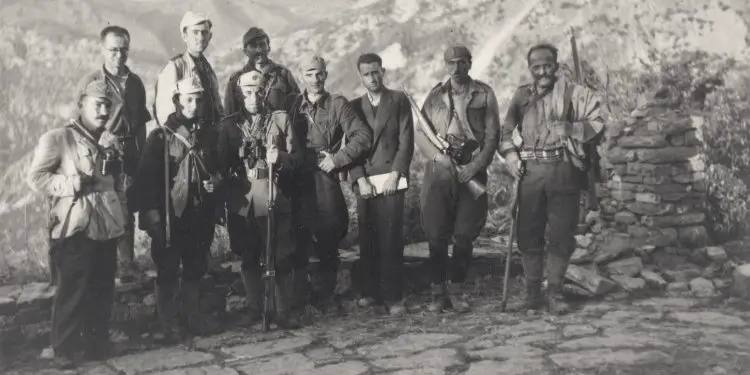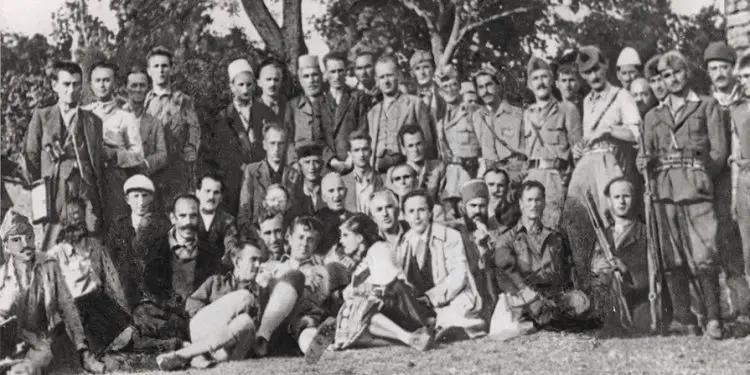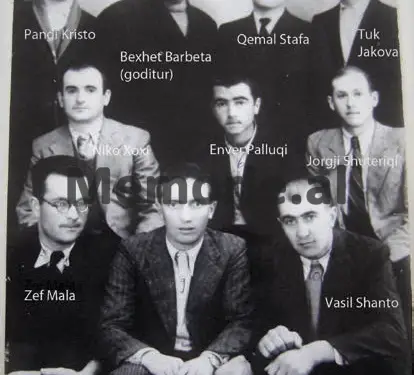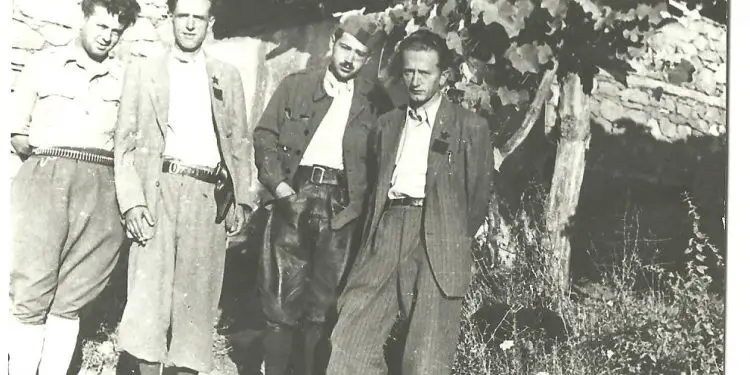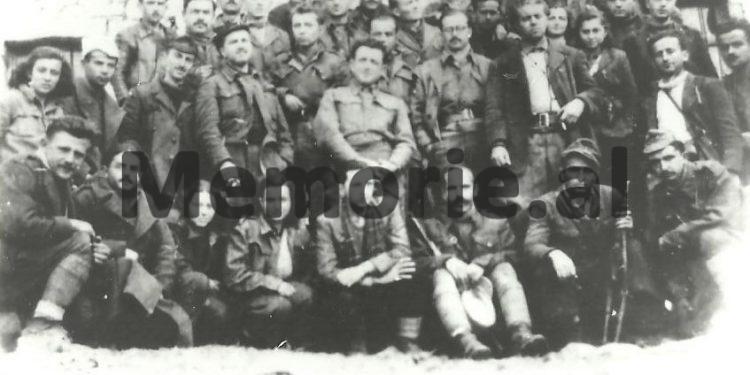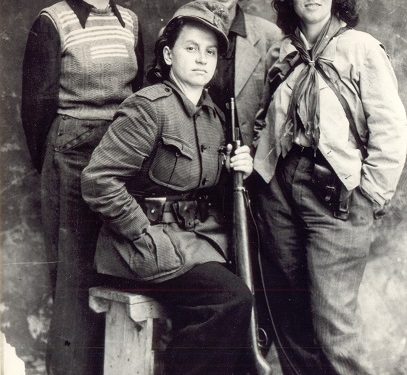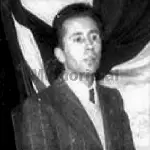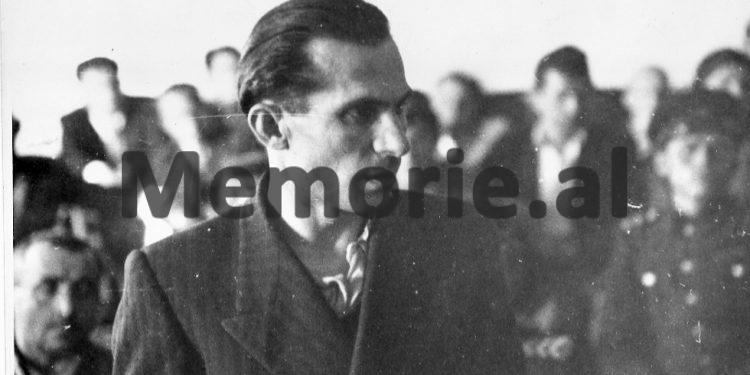By Prof. Nor. Dr. George P. Titani
Memorie.al / “After the murder of Qemal Stafa, I and many other communists went illegal. Qemal’s murder was a painful event for all of us. In these conditions, all the anti-fascist organizations, the party, the youth, the women, even the debaters were instructed to be careful, to guard against provocations and to be deeply conspiratorial”.
“This is what Mrs. Naxhije Dume Kerenxhi, the former first female member of the Central Committee of the Albanian Communist Party since its creation and the first female minister in the post-war communist government, headed by Enver Hoxha. For more about her activity and the main leaders of the Communist Party and the Anti-Fascist National Liberation War, Mrs. Dume, you know us in this interview.
Ms. Naxhije, how does your activity continue after you went underground?
After going underground, I started working with schoolgirls without fear, because I didn’t really stand out, I just dressed like an ordinary city girl, so I moved freely, although the fascist police had distributed my photo as a person in search. The photo that the police had distributed was taken from the photos that we had submitted to the school directorate, for the high school diploma documents.
In addition, my two sisters were married to officers, one from the Gendarmerie and the other from the rear of the army, and this fact was in my favor. On June 22, 1942, when we were listening to the news on the occasion of the one-year anniversary of the beginning of the war against the Soviet Union and the balance of the operations of the Red Army, Misto Mame, whom I was a great friend and I respected because, he was perfect boy and master of the war conspiracy in the city, that by order of the Central Committee of the Albanian Communist Party, I was assigned to the party affairs, near the PKSh Circle in Korça, so I should leave without delay, for there.
Already there you would have other more important tasks and extensive acquaintances with young and old communists, from the city and the countryside. What were the bases of the war and the leaders of the District in Korça?
I was instructed to hand over the party link to Comrade Petro Papi, one of the militant leaders of the war there. He immediately set me on a secure footing. After a few days, Nesti Kerenxhi, who would later be my life partner, came and took me. We went together to the first meeting of the District Committee, where my first presentation was made. In this meeting, I was in charge of women’s and young women’s organizational work.
I remember that the political secretary at that time was Pandi Kristo, one of the old members of the Communist Group of Korça and one of the first members of the NPK. He had an important activity as a communist, which I got to know better during my activity in this District, where the Anti-Fascist War had broken out on a large scale, both in the city and in the countryside.
I remember that initially, I was sheltered in the family of Dhora Leka, Marika Leshnja, Efti Iftica, Nasi Gjoka, the family of Mina and Shega Uçi. Minai was a noble man and an old communist, who surprisingly was then expelled from the PKS, while Shega, a special, energetic and wonderful woman, was the daughter of the great patriot, Petro Nini Luarasi. Minai’s house was in a very exposed position, so I went there often, but I stayed a little.
The important bases for me were the houses of the families: Shamblli, Llambi, Jorgji, (George), and another family, somewhere in the neighborhood of Vlach, Samsuri, Stasa and many others. One of the special bases was the family of Dylbere Baçi, a teacher at the Female Citizen School. Liri Baçi (Kolaneci), later she became the wife of the prominent partisan commander, Teki Kolaneci, was one of our school friends, but in a lower class than me.
Fiqrete Shehu also came from Tirana, with a recommendation to the address of Liri Baç. I remember that we also sheltered Nako Spiro in this base. Another base was the family of Qerime Progri, the mother of the martyr Demir Progri, who was killed together with Fuat Baban, in the siege of the “Morava” gang in Baban i Devolli, as well as the mother of the partisan, Ali Progri. I single out the family of Emili Shahini, who sheltered me as her daughter during the worst fascist terror.
In their house, I was surrounded twice and on both occasions, I miraculously escaped thanks to the care of these wonderful people. Emili Shahini, with her humane profession of midwife, was welcomed in all Korça families, not only for the love she showed for young mothers and newborn children, but also as an excellent activist of the Anti-Fascist Movement.
What other host families can you name?
In the family of professor Xega and his wife, Parashqevisa, I took refuge for a while in 1944. There, I was rescued by the brave Communist guerilla Gaqi Koroveshi, who was later killed, as far as I remember, around the month of March, they leave a little girl about 7-8 years old.
On this basis, I also stayed with Vera Pojani and Elektra Samsuri, even there we experienced the murder of Vera’s father and brother, somewhere near the “Majestik” cinema in the center of the city. In Eleni Panduku’s family, I found warmth from my mother, whom I missed a lot; let’s not forget that I was only 20 years old then. There I found my classmate, Sofika, and her three sisters.
I have taken refuge in the house of the very honorable veteran Nepsi Kerenxhi, a participant with a weapon in his hand in the wars for the independence of the homeland. Nepsi was a respected figure of the national movement in Korça and beyond. His wife, the honorable Mrs. Xanthipi Kërenxhi, former student of the first girls’ school in Korçë. All four children of this honorable family were participants of LANÇ.
Niko Dishnica family, honored family of a national veteran, member of the “Vatra” Federation, close friend of Avni Rustemi and Fan Noli. His honorable wife, Marika Dishnica and their three daughters: Dhimitra, Tefta and Afërdita, made themselves completely available for the War. Also, I took shelter in the house of Sabri Qyteza, a man of wide culture, a true researcher of our history.
His studio was a real historical archive, although he was very old, he had not stopped his work. He never hindered his very young daughter, Dodona Qyteza, in her dangerous activity. Nako Spiru is also sheltered in their house. May many honorable families from Korça forgive me, who have sheltered me as their child in that very difficult time, when the fate and life of people and of an entire family and not just one person was at stake?
Because after 60 years and after all the ordeals that I, my husband, children and all my relatives have gone through, I have forgotten many names, but never the basics and never the warmth of patriotic Korça families, in the face of the fascist and Nazi coldness of that dangerous and full time tension. The activity with women and young women in Korça was very interesting, because the environment was in favor of LANÇ.
Did you get to know the cadres of LANÇ of Korça, who were not few?
In Korçë, I mostly got to know the members of the Circle, including young and old communists such as: Pandi Kristo, Miha Lako, Ymer Dishnica, Taqi Skendi, Dhori and Ilektra Samsuri, Nexhip Vinçani, Pëllumb Dishnica, Vangjel, Nella, Raqi and Nesti Kërenxhi. , Vaskë Koleci, former student at the ‘Normal’ school in Elbasan, Ramadan Xhangolli, Koço Theodhosi, Kleopatra and Todi Maliqi, Nasi Gjoka, Kiço and Raqi Shamblli, Nesti and Petraq Titani, Andon Cicani, Todo Manço, Tasi and Xhoxhi Blushi, Sotir Manushi, Andrea Ziu and others, if we list them all together, it will be too much.
Inside the city, there was the activity of guerrilla units, of sensational assassinations against spies and traitors. Distributing communiqués, writing slogans against the fascist occupier, in prominent places, collecting aid and armaments for the war. Meanwhile, the first partisan detachments of Morava, Kolonja, Gorë-Opar, Mokra, Ostrovica, Vithkuq, Rrëza e Korça and others were created and the phase of transition to the creation of partisan battalions and territorial forces of the country was being prepared.
Did you have a relationship with the Greek anti-fascist forces of ELAS?
For the sake of truth, the city of Korça has helped a lot in supplying food and clothing to the Greek partisan forces ELAS, which were led by the brave captain, Aris Veliqotis and General Stefanos Sarafis, the Commander-in-Chief of these troops. The Greeks really sent money to us in Korça, mainly gold coins that they disguised very carefully, placing them in the double bottom of cheese tins, which was administered with proverbial hospitality and honesty by our wonderful friend, Koço Theodhosi who I am convinced, a thousand percent, was shot for nefarious political purposes. Our wonderful friend Teodor Sterjo also dealt with economic and propaganda issues.
Anyway, we secured the materials with great difficulty and then we started for the destination, which was not an easy task to accomplish. What is the truth, for all these interactions, which were carried out with great risk, I have not heard from the official Greek bodies even a word of gratitude, although we were fighting our common enemies. Another aspect, which I want to emphasize, was the organized work, especially with women and young women, who carried out a large volume of activities for the war. They prepared thousands of pairs of socks, jerseys, scarves, woolen gloves for the partisans. They collected help in money, cheese, flour, cloths, shoes that were prepared by the wonderful Korčari shoemakers.
Also, they collected clothes, medicines and other things, which we transported from there to the destination, by all means and possibilities: with animals, carts, vehicles, and even with people, when necessary. With young women and girls, we conducted special specialization courses for nurses and sanitary workers, seamstresses and others. They took part in numerous agitational-propagandist meetings and education courses, where they collectively read war communiqués and other communist education materials.
Such were our friends: Kleopatra Maliqi, Viktori Titani, Afroviti Titani, Aleksandra Sofroni (Misha), Ollga Mitrushi, Dhora Kristo, the wise wife of Pandi Kristos, Sofika Xoxe, the wife of Koçi Xoxe, Meropi Vulkani, the wife of Sotir Vulkani, Sofika Pirgu, the Serani sisters, Vangjeli Kristo, Shega Uçi, Liri Baçi (Kolaneci), Eleni Panduku, Elektra Samsuri, Andromaqi Themeli, Emili Shahini, Eleni Terezi (Pashko), Vera Pojani (Ngjela), Katina Starja, Efti Iftica, Zhuljeta Frashëri , and many, many others, most of which volunteered to be partisans and fought with particular bravery.
Naxhie Dume, the only member of the Central Committee of the SNP, since the First Country Conference of March 1943 in Labinot of Elbasan, who has survived. How do you feel today after 60 years, when there is no one left alive from that Central Committee of the SNP?
I feel proud, but at the same time worried, even very hurt. How many beautiful lives and fortunes have been extinguished and ruined by the long and merciless struggle for power! To live long means to suffer disappointments and not small sorrows. It means to experience, the loss of friends, of loved ones, to experience disappointments for the killing of your youthful dreams and beautiful ideals killed, maimed of your wonderful friends, from those you once had called comrades, leaders and then turned out to be renegades, even more than that, political opponents, devilish deceivers, murderers, criminals.
In the spring of 1943, in the village of Polenë, near Korça, new elections were held for the composition of the new District Committee of the KPSH, for Korça, as well as the election of delegates to the First Country Conference of the KPSH- of, which would be held in Labinot of Elbasan, from March 17 to 22, 1943.
The proceedings of the Korça District Conference were very competently directed by Ymer Dishnica, who had long since returned from university studies in France and had opened his medical clinic in the city and had already been co-opted into the central leadership of the National People’s Congress. At the Polena Conference, six delegates were elected to the First Country Conference, which were: Pandi Kristo, Petro Papi, Naxhie Dume, Nexhip Vinçani, Nesti Kërenxhi and Pëllumb Dishnica, as well as two guests, who were Miha Lako and Pilo Peristeri.
How did the first conference of the NPSH that was held in Labinot proceed?
70 delegates and guests from all over the country participated in Labinot, and the Permanent Central Committee of the SNP was elected, consisting of 15 members and 5 candidates. Among them were: Enver Hoxha, Koçi Xoxe, Ymer Dishnica, Tuk Jakova, Pandi Kristo, Nako Spiru, Vasil Shanto, Hysni Kapo, Gogo Nushi, Kristo Themelko, Nesti Krenxhi, Ramadan Çitaku, Petro Papi, Bedri Spahiu, Gjin Marku, myself , Liri Gega and others that I don’t remember. Enver Hoxha was elected General Secretary of the SNP, with the proposal of Miladin Popovic.
Who was elected organizational secretary of the Central Committee of the NPSH?
Koçi Xoxe was unanimously elected the Organizational Secretary of the Central Committee of the SNP, although he was in Tirana prison. Koçi Xoxe was unanimously elected as the Organizational Secretary of the PKS, although he was not present at the Conference because he was imprisoned in Tirana prison. After that, the Anti-Fascist National Liberation War got a bigger expansion, especially in the south of the country and the prefectures of Shkodra, Dibra, the region of Peza and Kosovo. Already, partisan armed forces were being created in Peza, Korçë, Shkodër, Dibër, Martanesh, Çermenike, Vlorë, Gjirokastër, Mallakastër, Tepelën, Përmet, Skrapar, Mokër and other provinces of Albania.
The time had come for the preparation and formation of the UNCL General Staff, because the partisan forces had increased a lot and needed a more professional and qualified direction. The war was taking on new dimensions and required, as a necessity, the centralized and specialized direction of the partisan and territorial armed forces. After the proceedings of the Labinot Conference, we returned to Korça, to implement its important decisions. The First Country Conference took on the dimensions of a small but necessary party congress, in the specific conditions of the war, because it elected the Permanent Central Committee of the SNP.
He elected the General Secretary and the Organizational Secretary of the Central Committee, which until then had not been done by any important meeting of the Albanian Communist Party. At this Conference, the composition of the Political Bureau was approved and important decisions were made for the expansion of the Partisan Army and the creation of the General Staff of the UNCL, which would be created, only after three and a half months, on July 10 of the year 1943, in Labinot of Elbasan, being rightly called the day of the creation of the Albanian partisan NAÇL Army.
Your contemporaries have expressed that you discussed against the current of the Conference. Did you not have consequences from this excessive courage when, day by day, Enver Hoxha was showing himself as an intolerant and extremely harsh leader?
No, not at all, I was frank and spoke my mind, without second thoughts. At that time, Enver Hoxha had not yet turned into a man who dictated over others, into an intolerant leader. Here’s what happened specifically. At the Conference, after Mehmet Shehu spoke about the army and its successes, I, excited, discussed contrary to the spirit of the Conference and proposed that the partisan detachments should not be expanded, but rather remain what they were or, should be narrowed and in the meantime, to specialize more, being constantly qualified in terms of combat preparation, so that we had as little loss in people as possible.
My discussion was misconstrued and I ate a good meal that would later cost me quite a bit and haunt me for the rest of my life. Already, someone had started to mention and record our mistakes, to record them and remind us later, which seems strange, but I think that this was the experience of those who were removed as our friends and comrades.
Also, in my discussion, I raised many issues for the youth and especially for the female partisans, who were constantly being added to the ranks of the combat formations. I emphasized that the comrades should not be engaged in secondary activities, such as washing clothes, sewing and mending clothes, etc., but that they should be assigned concrete combat tasks and mainly sanitation, nursing, hospitals, agitation and propaganda and others.
When you were in Korça District, Fiqret Shehu also came there, after being released from Tirana prison, which had been expelled from the party. What were your relationships with her as school friends you had been?
During my work in the Korça District, I had contacts and socially helped Fiqrete Sanxhaktari (Shehu) and I think I acted rightly because I could not act otherwise, because I had her as a school friend and ideal. She had been sent to Korçë, with severe party measures, as if she had been expelled from its ranks, in order to temporarily leave the premises of Tirana. My relations with him were like with all other war comrades.
I even thought that Fiqretja should be helped more than the others, since she was accused and convicted of terrorism, for the kidnapping of the little girl of Man Kukales in Tirana, which contradicted our principles of War, this case which is already known by almost the entire opinion, so for this problem, I don’t want to linger.
Meanwhile, Fiqrete Shehu in Korça District worked well and in the first case, when the establishment of the First Assault Brigade was inaugurated in Vithkuq, Korça, she was attached to the headquarters of this Brigade and as is known, later she fought well and married Mehmet Shehu. However, she was re-admitted to the National People’s Congress and was assigned to the political section of the Brigade, then deputy commissar of the First Assault Brigade. Fiqret Shehu, in those years, was a prudent, wise and listenable woman.
During the work and management of the party bodies in Korça, I have received and escorted to the General Headquarters, many friends from Tirana or other districts of the country such as: Sejfulla Maleshova, Vasil Shanto, Nako Spiru, Nexhmije Hoxha, Liri Belishova and many, many others. What I want to explain is that several times I also waited on Vukmanovic Tempo and his wife. Memorie.al




